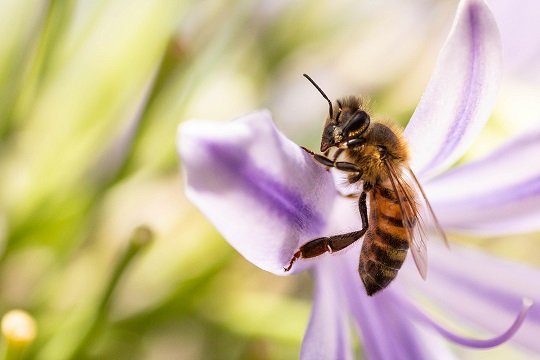Agapanthus is one of the number one flowering plants that come to mind to attract insects and brighten the garden. But for someone who dislikes bees, this can be somewhat problematic!
Agapanthus attracts bees because of the colors of the flowers and the pollen that the flowers produce.
Pollen is a nutritious substance that many insects including bees need.
If your goal is to attract bees, agapanthus plants and other flowering plants are the best way to do it! But, be careful! Agapanthus can become a weed when left unattended in desirable conditions.
3 Reasons Why Agapanthus Attract Bees
Indeed, agapanthus attracts bees, and possibly a lot of them!
There are a few reasons why bees are attracted to agapanthus plants. Unsurprisingly, almost all the reasons revolve around their uniquely colored flowers.
- Bees are more attracted to agapanthus plants due to their violet, blue, and white flowers. These colors appeal more to bees as they are most visible to their eyes.
- Agapanthus produces pollen and nectar which bees need. But, at the same time, bees visiting the flowers often play a large role in facilitating pollination between agapanthus plants. As a result, you can say they need each other!
- Another reason why you’re likely to find lots of honey bees around your agapanthus is due to its flowering timeline. When agapanthus plants are flowering, it also happens to be the breeding season for bees. They will spend a lot of time collecting pollen to feed their offspring.
Benefits and Disadvantages of Bees
Is agapanthus attracting bees a good thing or a bad thing? You can deduce the answer for yourself. Here we’ve discussed the positives and negatives of having bees in the garden.
Benefits
Bees are not always bad news! If your agapanthus attracts bees, it could be for a good cause. Maybe we can change your mind about not like bees. Below are some reasons why bees are actually an essential part of every garden.
- Bees are natural pollinators that contribute to the longevity and flowering potential of more than just your Agapanthus plants. Some plants are pollinated solely by bees so you may not want to get rid of them that fast!
- Hate them or love them, bees hold an important place in garden ecology. Removing them from the web could be catastrophic for the remaining insects and surroundings.
- Honey bees are the only makers of honey. If everyone decides to rid their gardens of them, this could threaten future honey production.
Disadvantages
Bees aren’t always the best garden guests and could interfere with gardening and other activities.
- When bees decide to build a hive in the garden or even worse inside your house, it can be dangerous. It just takes one agitated bee to cause a dangerous situation that will incite the entire swarm!
- Tending to your agapanthus may result in a sting if you have lots of flowering plants in your garden. The more plants that flower at the same time as agapanthus, the more is the likelihood and number of bees in the garden.
What Else Does Agapanthus Attract?
Agapanthus is a common garden plant in several countries having warm climates. In addition to these warm climates, you’ll find that certain animals and insects are a regular sight in the garden.
Besides bees, your agapanthus attracts butterflies and even hummingbirds. The pollen and nectar from the flowers lure these visitors in from the vicinity.
Unfortunately, that’s not all agapanthus attracts! Some harmful creatures such as slugs and snails will use agapanthus leaves as a refuge by day. But, at night they reveal themselves to feed on the leaves.
Failing to control them may lead to a diminished plant eaten to the ground.
How to Keep Bees Away From Agapanthus?
Bees may be great for pollination purposes but that’s as far as it goes! Bee stings are not pleasant especially when there’s a swarm involved. We won’t be judgemental if you ask how to keep bees away from agapanthus.
#1- Bee Deterrent Agapanthus Companion Plants
Companion planting goes a long way in keeping these friendly but dangerous insects away. Bees naturally dislike most herbs and spices due to their potent smell.
- Cucumber has acidic peels that will keep away bees as well as wasps.
- Citronella, Cloves, Eucalyptus, Mint, and Neem all have potent aromas which dissuade bees.
- Red flowers (examples: Marigolds and Geraniums) will not attract bees as they cannot see red. To bees, red appears black and is not attractive at all.
Bee repellent companion plants are the best way to keep bees away from agapanthus plants without harming the bees.
#2- Insectivorous Plants!
There is only one plant that unbiasedly eats insects! Pitcher plants can be a help in the garden when you wish to get rid of a few unwanted bees.
These plants have a sticky substance and an open vessel-like leaf that attracts insects and then devours them when they get stuck. If it can grow well in your garden, there is no harm in planting one or two.
Pitcher plants can also help to remove other unwanted insects in your garden.
#3- Vinegar
This chemical works well as a bee deterrent. Although, we should add that this is only a temporary solution that should be used in emergencies! The smell of this acidic substance is not very appealing to bees let alone ants as well.
Conclusion
Yes, agapanthus attracts bees among other insects and even birds! What do they all have in common? They all feed on or have some use for the pollen produced by agapanthus.
Bees are attracted to agapanthus because of the pollen and nectar that their flowers produce. Pollen acts as the sole food on which hatched bee larvae will feed.
Bees are excellent pollinators and an important part of making a gardening space perfect and balanced.
However, you just have to be careful not to get stung or provoke a nearby hive or bee swarm! Bees are not to be played with!
Bees are not the only injury to worry about! Do you have to worry about Agapanthus being poisonous?
FAQs
Yes, butterflies are attracted to agapanthus plants for their flowers. The pollen and flower colors are what draw butterflies to these flowers. Another reason why agapanthus flowers may seem most attractive is the large number of individual flowers that make up the entire flower head.
Bees are most attracted to white, blue, and violet. So, plants not bearing these colors will not attract bees that much. Also, flowers that are red are not so palatable to bees since they bear an unappealing odor.


